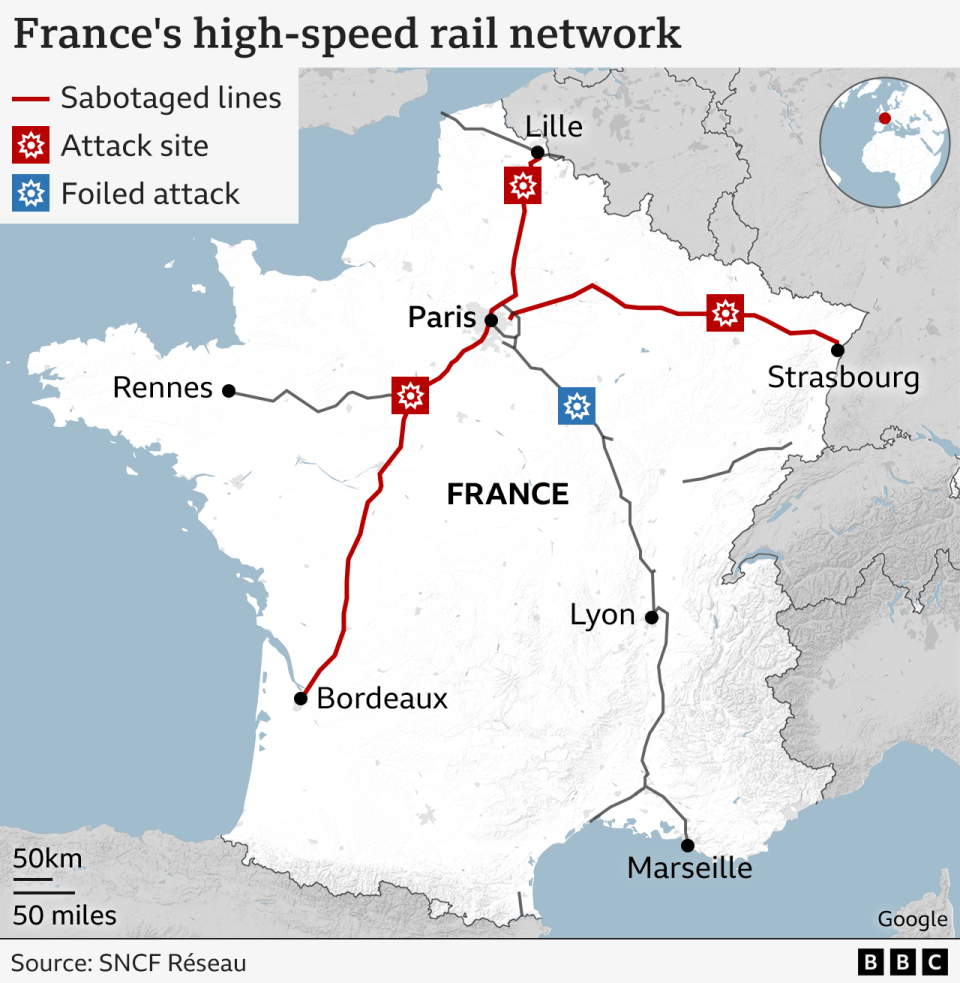For French Interior Minister Gérald Darmanin, the man responsible for security at the Olympic Games in Paris, the sabotage attacks on the high-speed train network are a blow.
He has promised that all attackers will be arrested soon, but he has not yet identified who is to blame.
Sports Minister Amélie Oudéa-Castéra promised that the perpetrators would not spoil the party, but they did carry out an attack on the TGV network just hours before the opening ceremony, causing chaos for travellers and exposing the vulnerability of a symbol of French technical prowess.
Temporary Prime Minister Gabriel Attal advised caution in drawing conclusions, but said those behind the attack clearly understood what would cause the most damage.
Security sources informed the French media and suspicions were immediately directed at far-left radicals. However, no one has claimed responsibility.
So far, all we know is that the methods used to set fire to vital fibre optic and other cables in the railway network conduits in the early hours of Friday morning were reminiscent of previous attacks by the far-left.


When cable ducts were set on fire along railway lines near Hamburg, Germany, last September, an anonymous claim appeared on a left-wing website condemning the “capitalist infrastructure.”
Of course, that is not conclusive, because the scale of the French attacks suggests a degree of coordination between four different regions that would not normally be associated with the far left.
But whoever set their sights on the railway lines from Paris in the early morning of July 26, it was clear that they had the Games in mind.
The major TGV routes to the north, east and west were all closed and the high-speed line to the south-east would also have come to a standstill, if a team of engineers had not accidentally spotted a team of saboteurs in ‘vans’.
Regional forces are gathering evidence under the overall command of the National Police, the National Gendarmerie and the anti-terrorist SDAT. Their best hope may lie in tracking down the failed saboteurs who fled the scene near Vergigny, apparently leaving their incendiary devices intact.
There have been attacks on French railways before, including in January 2023 east of Paris.
Another incident did not occur until early May 2024 on the high-speed line to the south, just outside Aix-en Provence.
It is that attack that most closely resembles Friday’s sabotage, as it reportedly took place on the day the Olympic flame arrived by ship in the southern port of Marseille. So far, no arrests appear to have been made.
Although it was a failed attempt, which reportedly involved the use of improvised Molotov cocktails, French security services are investigating possible links to the attack.


Earlier this year, the interior minister warned of an extremely large “external” threat, possibly of the type of jihadist attack that took place in March on the Crocus City Hall in Moscow.
France has suffered a wave of deadly jihadist attacks in recent years, but none have come close to the acts of sabotage carried out on its rail network. Friday’s incidents caused misery for hundreds of thousands of passengers, but no blood was shed.
Russia will also undoubtedly come under suspicion, as it is facing a large-scale invasion of neighboring Ukraine and has waged a massive disinformation campaign against France.
Pro-Kremlin social media accounts shared a video smearing the Paris Olympics, ridiculing the water quality of the Seine and attacking President Emmanuel Macron and Paris Mayor Anne Hidalgo.
In Moscow, Macron is loathed for his open support for Ukraine.
Although Russia has consistently denied any interference, French officials suspect Moscow’s hand in a series of recent incidents aimed at destabilizing the French capital, from red hands on the Holocaust memorial to graffiti on buildings suggesting their balconies could collapse.
Just this week, a Russian was arrested in Paris on suspicion of planning to organize acts of “destabilization, interference and espionage.” The Kremlin says media reports about the man have been “quite curious,” but says it has not been directly informed of the arrest.
But that does not mean Russia is necessarily involved in Friday’s coordinated attack on what caretaker Prime Minister Gabriel Attal calls the “nerve centres” of France’s high-speed rail network.
Because whoever was behind the sabotage knew exactly where to cause the most disruption. Russia may not have that kind of reach in rural France.
According to Jean-Pierre Farandou, director of the state railway company SNCF, the saboteurs concentrated on the intersections that would have the most serious consequences.
The Courtalain arson cut off two high-speed lines on the Atlantic artery, one running west towards Brittany and another towards Bordeaux in the southwest. The eastern attack knocked out high-speed lines to Metz in one direction and Strasbourg in the other.
Earlier this year, the SNCF pointed to an increase in attacks on the rail network and said it was constantly on the lookout for sabotage acts, “particularly in the run-up to the Olympic and Paralympic Games”.
Although the company claimed to have detected all attacks on its systems, it was only able to prevent one, which caused significant damage. That was pure luck.
“Today should have been a party,” said Jean-Pierre Farandou. “It’s all ruined.”







